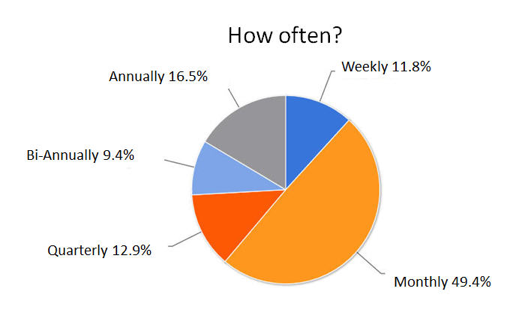



Are Performance Appraisals a Waste of Time?
Many managers, when asked their opinion about performance appraisals, report that they believe it to be an unwelcome distraction that serves little or no useful purpose. Many management gurus advise organizations against appraising their employees. Additionally, when organizations employ some form of appraisal, they often do this only as part of their annual salary review process.
How do Contact Centers Use Performance Appraisals?
In cooperation with Benchmark Portal, we recently undertook an Employee Retention Survey of 11,000 contact centers and discovered that over 90% of these call centers used performance appraisals. Such a response is unique to the contact center industry.
 Participants were asked how frequently they undertook performance appraisals. The pie chart shows how participants responded.
Participants were asked how frequently they undertook performance appraisals. The pie chart shows how participants responded.
It’s worth taking a moment to study this chart because it reveals that the contact center industry uses performance appraisals more and more frequently than any industry. Note how nearly 50% of these organizations undertake them monthly, which is a frequency unheard of in other industries.
Clearly, the contact center industry does not think that performance appraisals are a waste of time, but that such appraisals underpin the entire process they use to manage and develop employees.
Let’s take a look at the reasons for the difference in attitude between contact center managers and managers in other industries regarding the usefulness of performance appraisals.
Reasons for the Usefulness of Performance Appraisals for Contact Centers
- Contact centers are uniquely well able to measure performance. Most have technology that monitors each contact center employee in terms of key performance indicators such as:
- First-Call resolution
- Number of calls handled per hour
Contact centers employees work full time either on the telephone or using other automated systems where their performance can be determined through the data generated as they do this.
- Contact center employees are, for the most part, uni-disciplinary. Typically, each employee performs the same role. This makes it relatively easy for management to compare the performance of their employees.
- Many different contact centers work in similar areas of commerce and perform similar tasks. This makes it easier for management to compare their performance of employees in their contact center with employees of other similar contact centers.
- The performance measurements made during the process are both quantitative (as opposed to qualitative) and completely objective. The elimination of qualitative subjectivity means that:
- There is no argument regarding the accuracy of the resulting performance appraisal data.
- The data is not dependent on the personal opinion of the manager.
- This makes the feedback of performance issues much easier for the manager with the result that the process does not threaten the relationship between the manager and their direct report.
- Contact center managers find the process useful. In fact, contact centers use the process to weed out poor performers.
How Can Other Industries Benefit from Regular Performance Appraisals?
The role of a contact center employee is extremely demanding and, because of world-wide competition, contact centers have to be run in a highly efficient manner. Contact centers have been able to deploy performance appraisals so successfully because they are able to generate highly accurate and objective information and can easily compare the performance of their employees with those of other contact centers.
Many engineering organizations have similar accurate objective performance information available. For example, an organization producing a standard product line is able to develop a set of standards that describe how long an employee should take completing a specific task. Many highly successful bonus and piecework systems rely on this type of information.
In most organizations however, employees are faced with tasks that cannot easily be compared. Typically, these organizations have:
- Roles that, while similar, have challenges that are sufficiently different to make performance comparisons difficult, if not impossible.
- Roles where the challenges are totally different.
In such situations, managers have to rely more on subjective performance information with the result that confronting negative performance issues can put the manager-subordinate relationship at risk.
For these types of organizations to implement performance appraisals successfully and build them into the way employees are managed, the following issues need to be handled carefully:
- The challenges associated with each role need to be thoroughly identified.
- The resources necessary for the successful performance of every role need to be made available.
- When tasks are allocated to employees, precise timelines and targets should be established and documented wherever possible.
- The skills and knowledge necessary for success in each role need to be understood.
- Allowance has to be made for that fact that, for optimal performance, different roles will usually require different:
- Personality Types
- Thinking Styles
- Motivational Priorities
As the solution, an evidence-based recruitment and management development process needs to be put in place so that the organization can learn:
- What to look for to determine whether job applicants are likely to achieve high performance ratings.
- How best to manage employees.
Watch our video to learn how evidence-based recruitment helps with the recruitment of the right people for the right jobs and improves your organization’s employee retention and performance drastically over time.
You must be logged in to post a comment.